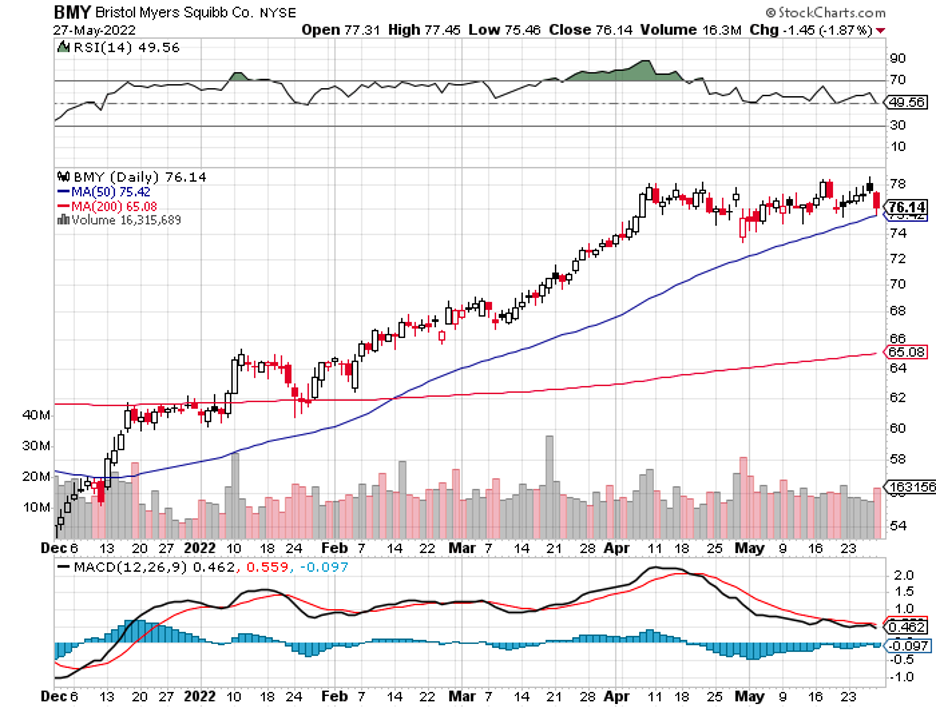A Low-Risk Stock for These High-Risk Times
A number of Big Pharma stocks have performed quite well in 2022, which is impressive considering the slump overtaking Wall Street these days.
Case in point, Bristol Myers Squibb (BMY) shares have gone up by over 20% year-to-date and are showing no indications of notable decline. It has fared remarkably better than the rest of the market and has been in positive territory since the year started.
The fact that BMY has been easily whipping the broader market despite headwinds like inflation, interest rate hikes, geopolitical tensions, and, of course, supply chain problems offers investors some semblance of peace of mind.
The first quarter of 2022 saw BMY’s revenue climb by an unimpressive 5% year-over-year to rake in $11.6 billion, with its adjusted earnings rising by 13% to reach $1.96 per share. While those earnings weren’t exactly disastrous, they were hardly impressive. A potential reason behind this involves BMY’s cancer treatment Revlimid.
Although Revlimid is still one of the top-selling treatments of BMY, more and more generic competitors have cropped up, which caused the decline in sales.
A notable challenger is Dr. Reddy’s Laboratories (RDY), which received the go signal from the court to start selling a limited number of its generic version after March 2022 despite Revlimid’s patent protection lasting until 2026. The same right was granted other generic drug developers like Natco and Alvogen.
This ruling already had a damaging effect on Revlimid’s revenue. This cancer treatment contributed $2.8 billion in revenue in the first quarter, marking a 5% drop year-over-year and missing estimates by roughly $100 million. For context, Revlimid sales reached $12.8 billion in 2021.
Nonetheless, several of BMY’s important drugs have delivered good results during this period. For example, Opdivo sales rose by 12% to rake in $1.9 billion. On top of that, Opdivo has been gaining additional regulatory approvals recently. Meanwhile, Eliquis, a collaboration between Pfizer (PFE) and BMY, generated $3.2 billion in sales, showing off a 12% climb.
Moreover, BMY has taken strategic steps to deal with the impending patent exclusivity losses. It has developed a deep pipeline of promising treatments, several of which are expected to replenish its current lineup and compensate for the slowdown in sales.
For instance, BMY recently gained FDA approval for heart muscle treatment Camzyos. Aside from this, the company’s plaque psoriasis candidate Deucravacitinib is also expected to receive regulatory approval within 2022.
Meanwhile, BMY anticipates additional approvals for its anemia treatment Reblozyl. To put things in perspective, Reblozyl raked in $156 million in the first quarter, registering an impressive double-digit growth of more than 39% year-over-year. This is indicative of the treatment’s potential.
Overall, the company estimates revenue to be between $10 billion and $13 billion by 2025 and reach $25 billion by 2029 for these newer candidates alone.
Needless to say, these new candidates could help BMY easily diversify its revenue streams and ensure that it doesn’t get too heavily damaged by generic competition.
After all, biotechnology and healthcare companies typically thrive thanks to the benefits their patent protections offer them, granting them some control over pricing. The moment their key drugs lose their exclusivities, compensating for the lost revenue becomes crucial for any company’s strategy.
Hence, BMY’s capability to continuously replenish its pipeline speaks volumes. In fact, this could be one of the primary reasons for the company’s success for over 100 years.
Moreover, with the uncertainty looming over the market, investors are desperate for safe stock to place their capital.
While it may not seem like the most exciting industry these days, healthcare remains one of the safest bets you could take. It is a historically defensive segment and offers protection thanks to the sheer inelasticity of the products in this space.
This is especially true in the case of BMY since the company focuses heavily on cancer therapies and drugs.
The mere fact that more than 92% of the US population are insured all but guarantees that BMY will not experience any shortage of clients even during periods of uncertainty.
Actually, it could very well boost its top and bottom lines.

